The Nutritionism Model & Food Industry Today
If you live in a westernized country, statistics show you find yourself in a position where 63% of daily calories come from highly processed refined foods, namely made up of a lot of sugar, a lot of white flour and a lot of unhealthy oils! Furthermore, 25% of calories come from animal foods, (most of which are consumed from animals which have been reared in a highly industrialized system, where their fat has been exaggerated and the animals grow artificially quicker than they would in natural conditions) leaving only 12% for whole, plant foods! Not much is it? And how people in the west are consuming it; in the car, in front of the TV, and increasingly alone is seriously compounding the rate at which obesity is occurring. On this diet 71% of adults are overweight or obese. Meaning 3 out of every 4 adults are seriously unhealthy and living with diet related health issues.
“There has to be a better way”.
Enter 'Nutritionism' so termed by journalist and food industry research writer Michael Pollan, this is the food industries answer to our food problems! We must need more nutrients, right? Well, in theory this sounds correct but it’s the way that the food industry is going about making sure we receive those nutrients that is the real problem. Instead of promoting, marketing and labelling the whole, plant based foods such as broccoli or apples as the healthy option, the food industry have decided that consuming ‘edible food-like substances’ (no longer the products of nature but of food science) is the way forward for us all. Foods are no longer seen as whole and perfectly engineered; instead they are being broken down into nutrients and individual constituents so that they can do empirical and reductionist research on the food item meaning our terminology and understanding of food remains totally nutrient based. Therefore ignoring the idea that food is essentially the sum of their nutrient parts and ideally utilised as a whole food to receive its total healthful benefits. The food industry trades on their ability to continually carry out this research on foods and therefore market and promote certain foods as being healthier than others.
Unfortunately, what ‘nutritionism’ has created are these 3 pernicious myths about food:
That what matters most is not the food itself but the ‘nutrient’ instead.
That because nutrients are invisible and incomprehensible to everyone but scientists, we need expert help in deciding what to eat.
That the purpose of eating is to promote a narrow concept of physical health.
Because food in this view is foremost a matter of biology, it follows that we must try to eat ‘scientifically’ – by the nutrient and the number and under the guidance of experts. We forget that, historically, people have eaten for a great many reasons other than biological necessity.
Food is also about pleasure, about community, about family and spirituality, about our relationships to the natural world and about expressing our identity. For as long as humans have been taking meals together, eating has been as much about culture as it has been about biology. That eating should foremost be about bodily health is a relatively new concept and I think a destructive one. Destructive not just to the pleasure of eating and food culture in our societies but also to our mental states.
I believe choosing to eat from the paradigm when food consisted of mother nature’s magic rather than the numbered gibberish we read on the back of ingredients labels is our only way to avoid the traps of the food industry. Eating from a time when we didn’t need a science textbook to decipher nutrition claims and when foods had a shelf life shorter than our attention spans. Who is with me on this?!


